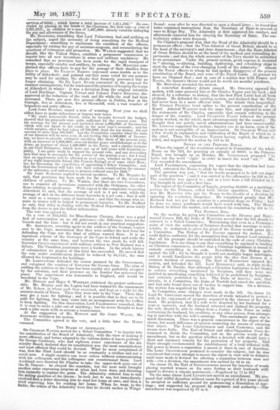THE BOARD OF ADMIRALTY. Sir Casures NAPIER moved for a
Select Committee "to inquire into the constitution of the Board of Admiralty, with the view of making it more efficient, and better adapted to the various duties it has to perform." Sir George Cockburn, who had eighteen years' experience of the Admiralty Board, declared that its constitution was the most unsatisfactory and least efficient that could be devised. What he most complained of was, that the First Lord should be so constantly a civilian and not a naval man. A single member can issue orders without communicating with ids colleagues, and his colleagues can countermand them. Lord Auckland once -directed Sir Charles to take the upper-deck guns out of the St. Vincent : he obeyed the mandate, but the next mail brought another order expressing surprise at what had been done, and directing hun instantly to replace the guns. The Admiralty ordered him to test the aailing qualities of the Queen : he took her to sea, but immediately received first a letter directing him to send her home at once and then a third reproving him for sending her home. When he went to the Baltic, the orders of the Admiralty were that he should anchor in Wingo Sound : soon after he was directed to open a closed letter he found that letter contained instructions from the Secretary of State to proceed at once to Loge Bay. The Admiralty at first approved his conduct, and afterwards censured him for obeying the Secretary of State. The contradictory orders were frequent. Sir Charles's proposal was, that the Head of the Admiralty should be a permanent officer ; that the Vice-Admiral of Great Britain should be at the head of the surveyor's and store departments • that the Rear-Admiral of Great Britain should be at the head of the medical and victualling departments ; and that the whole accounts of the Navy should be submitted to an accountant. Under the present system, great expense is incurred in " altering, re-altering, building, destroying, and rebuilding ships to meet the whims of the ever-changing Lords of the Admiralty. Almost all the Naval officers to whom he had spoken disapprove of the present constitution of the Board, and some of the Naval Lords. At present we have. no Channel fleet ; and in case of a sudden war with France and Russia, the Queen's throne would not be worth six months' purchase.
Mr. Beerrecie seconded the motion.
A somewhat desultory debate ensued. Mr. Osnorme opposed the motion, with some personal hits at Sir Charles Napier and his book ; and showed, by a reference to history, that the best First Lords had all been civilians. He defended the existing system, and declared that the Navy had never been in a more efficient state. The debate then languished. Sir GEORGE PECHELL leant rather to the present constitution of the Board. Admiral WaLcorr took the same line, and objected to some of the statements of Sir Charles, especially that remark referring to the danger of the country. Lord CLantece Paorr believed the present system worked, on the whole, most advantageously for the country. He thought that our purely naval administrations had been unsuccessful. Mr. LINDSAY supported the motion; inquiry can do no harm, even if the system is not susceptible of an improvement. Sir CHARLES WOOD said a few words in explanation and vindication of the Board of which he is the chief. Then, Sir CHARLES NAPIER having replied, the House divided, and negatived the motion by 162 to 35.


























 Previous page
Previous page